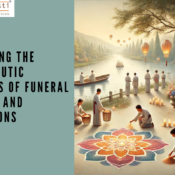
An Essential Guide to Hindu Funeral Rites
Losing a loved one is an inevitable part of life, and navigating the rituals and customs associated with their departure can be both challenging and overwhelming, especially in the case of an essential guide to Hindu funeral rites. Anthyesti, the Sanskrit term for the funeral rites in Hinduism, encompasses a series of rituals that guide the departure of the deceased soul from the earthly realm to the afterlife. In this essential guide, we will explore the significance, practices, and nuances of Anthyesti funeral services, providing insight into this deeply rooted aspect of Hindu culture and tradition.
Understanding the Significance of Anthyesti:
In Hinduism, death is viewed as a transition rather than an end, marking the departure of the soul from the physical body to continue its journey in the cycle of reincarnation. Anthyesti rites hold profound significance as they not only honor the departed soul but also help facilitate its smooth transition to the next realm.
Pre-Funeral Preparations:
Before the commencement of the funeral rites, several preparations are undertaken by the family members and the community. The body is bathed and dressed in clean clothes, symbolizing purity and respect for the deceased. It is customary for the family to gather and seek blessings from elders and priests, who offer guidance and support during this challenging time.
Rituals and Practices:
- Antyeshti Samskara: This is the primary funeral ritual that encompasses a series of ceremonies performed to guide the departed soul. It typically involves chanting of Vedic hymns, offering of prayers, and the lighting of the funeral pyre.
- Cremation: Cremation is the most common method of disposing of the body in Hindu funeral rites. The funeral pyre, traditionally made of wood, symbolizes the release of the soul from the physical body and its journey towards liberation (moksha).
- Asthi Visarjan: Following cremation, the ashes (asthi) are collected and immersed in sacred rivers or bodies of water, such as the Ganges, Yamuna, or Saraswati. This act symbolizes the return of the physical elements to nature and signifies the completion of the funeral rites.
- Mourning Period: The family observes a period of mourning, during which they abstain from certain rituals and customs as a mark of respect for the departed soul. This period may vary in duration, ranging from several days to weeks, depending on regional and cultural practices.
Cultural Variations and Regional Customs:
Hindu funeral rites vary significantly across different regions and communities, reflecting diverse cultural influences and traditions. While the core rituals remain consistent, there are variations in practices, prayers, and customs observed during Anthyesti ceremonies. It is essential to consult with knowledgeable elders or priests to understand the specific requirements and customs relevant to the community.
Role of Family and Community:
The support of family and community plays a vital role in facilitating the funeral rites and providing comfort to the grieving family. Relatives, friends, and neighbors offer condolences, assistance, and emotional support to help alleviate the burden of grief and mourning.
Modern Adaptations and Challenges:
In contemporary times, Hindu funeral rites have undergone certain adaptations and transformations due to changing societal norms, urbanization, and technological advancements. While traditional practices are still revered and upheld, there is a growing trend towards modernizing certain aspects of funeral ceremonies, such as the use of electric crematoriums and online memorial services.
Conclusion:
Anthyesti funeral services embody the rich tapestry of Hindu culture and tradition, offering a profound insight into the beliefs and practices surrounding death and the afterlife. Through rituals, prayers, and ceremonies, families seek solace and closure while honoring the memory of their loved ones. By understanding the significance and nuances of Anthyesti rites, we gain a deeper appreciation for the timeless wisdom and spiritual insights embedded within Hindu philosophy.
In times of loss and grief, the guidance of elders, the support of community, and the solace of ancient rituals serve as beacons of hope and comfort, guiding the departed soul on its journey towards eternal peace.
May the light of wisdom and compassion illuminate the path of those who embark on the sacred journey of Anthyesti, honoring the legacy of their loved ones with reverence and grace.
Contact us 9883318181
All Categories
- Ambulance (6)
- Anthyesti Biopic Cinema (11)
- Blogs (330)
- Condolences (8)
- Cremation Center (10)
- Cremation Service (58)
- Dead Body Carrier (20)
- Dead Body Freezer Box (49)
- Dead Body Transport (132)
- dead body van (3)
- Death Ceremony (8)
- FAQ (18)
- Freezer box (20)
- Funeral Communities (10)
- Funeral Service (53)
- General (5)
- hearse van service (48)
- Last Rites Pujas (2)
- Last Rites Rituals (10)
- Media Mentions (9)
- Pind Daan (1)
- Pitru Paksha (3)
- Pre Planning Funeral (11)
- Priest Funeral Service (1)
- Shraadh Rituals (3)
- Uncategorized (3)
- Vaikunta Samaradhane rituals (1)
- We are in News (19)





